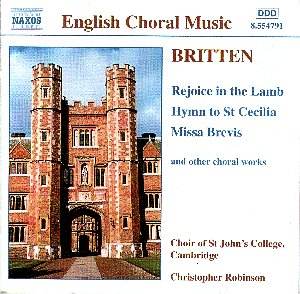Benjamin BRITTEN (1913 - 1976)
Rejoice in the Lamb, 16'04"
Hymn to St. Cecilia 10'18" and other choral works.
 Choir of St. John's College,
Cambridge.
Choir of St. John's College,
Cambridge.
Conducted by Christopher Robinson.
 Recorded 13 - 15 July 1999,
Cambridge. DDD Naxos 8.554791
[73'48"]
Recorded 13 - 15 July 1999,
Cambridge. DDD Naxos 8.554791
[73'48"]
Crotchet
Amazon
UK
Amazon
USA

Ten choral works by Benjamin Britten and a short piece for solo organ make
up a balanced and generously filled Naxos disc. From 1999 recordings, the
release gives an indication of the present standard of the Choir of St John's
College, Cambridge under its current Director of Music, Christopher Robinson.
Rejoice in the Lamb, Britten's 1943 setting of Jubilate Agno by
Christopher Smart, is based upon one of poetry's more weird offerings. The
writer was incarcerated in a lunatic asylum in 1756 for a form of religious
mania and his poem reflects this in an innocent, childlike faith which strikes
us as strange even today. Included in the eight sections is a poem For
I will consider my cat Jeoffrey and the feline's daily devotions
which involve twisting his body around seven times each morning. Britten
chooses to set this part for a rather plaintive treble voice. He uses an
alto to tell the tale of a male mouse that prepares to challenge a cat to
protect his mate. The Te Deum in C, from 1934, contrasts a solo treble
voice with the rest of the choir, while the short Jubilate Deo of
1961 has some sprightly organ playing.
In Antiphon - as the title suggests - there is interplay between the
sections which ends with an eventual coming together of the trebles and the
mens' voices.The Hymn to the Virgin shows even then (1930) Britten's
originality in the way he sets a small group singing a Latin text against
a poem in English from c1300. The Festival Te Deum is at its most
effective when the closing let me never be confounded is sung by the
solo treble. In Hymn to St. Peter Britten again interposes a Latin
text into the English verse while the text of A Hymn of St Columba
uses a text attributed to the Saint himself. The Hymn to St Cecilia
(words by Auden) - a brilliant setting, superbly sung with fresh sounding
boys voices and the men contrasting in a full-blooded performance. Iain
Farrington is the fine soloist in Prelude and Fugue on a theme of Vittoria
- the Spanish composer whose work would probably have been scarcely known
in 1946 when Britten wrote the piece. It is a short, intriguing piece with
some attractive harmonies, and sadly Britten's only venture into the field.
A pleasant recording, with some excellently drilled singing, immaculate diction
and typical of what one would expect from a choir at the highest level of
the Anglican Church tradition.
Reviewer
Harry Downey

